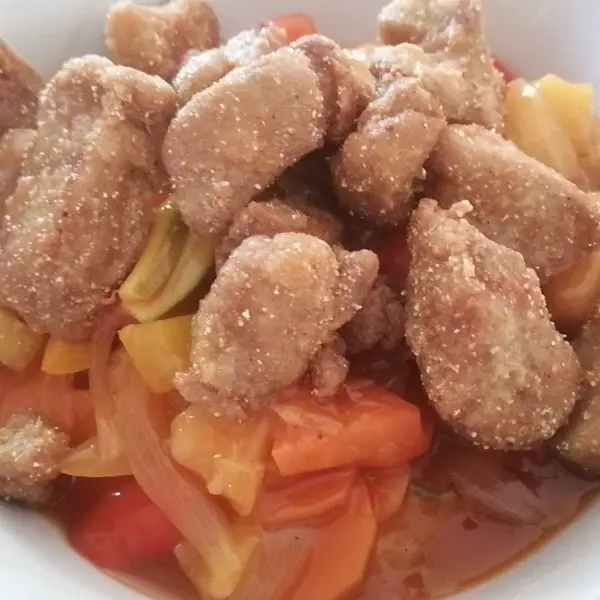Sweet and Sour Pork
6
servings45
minutes30
minutes270
kcal1
hour15
minutesSweet and sour recipes make one’s mouth salivate instantly – well, mine at least. There is something magical about the flavours developed in this recipe – an instant favourite amongst all our guests. So little effort is required to make this dish, which can be portioned out and frozen.
Ingredients
- Pork
500g pork such as lean belly pork or leg of pork
Cornstarch / Mazeina to coat the pork. Use Maize meal or polenta for a coarser coating which allows the sauce to stick better
Salt and Pepper
Oil for deep frying
- Sauce
400g tin pineapple rings
2 green peppers chopped into 1cm squares or strips
2 medium onions
3 cloves garlic
2 carrots diced
Other vegetables to your taste such as baby corn, sugar snap peas, or celery
1 cup vinegar
1 cup ketchup or similar tomato sauce
4 tablespoons brown sugar
2 tablespoons soy sauce
1 tablespoon oil for frying
Salt and Pepper
Cheap sherry to thin the sauce or help in the stir-frying if required
1 teaspoon of cornstarch / Mazeina mixed with water to thicken the sauce
Directions
- Sauce
- Drain the tin pineapple into a mixing bowl, reserve the liquid. Cut the rings into 1cm pieces.
- Add the vinegar, sugar, ketchup, soy sauce to the mixing bowl and stir.
- Heat a wok or saucepan and add a little oil for frying.
- Add the pineapple when the oil is almost smoking. The pineapple will develop a brown colour, turn the pieces over.
- Add the onions, carrots and green pepper and the other vegetables if using them. Stirfry for about 5 minutes to allow the onions to become translucent and the carrots to brighten a bit. If the wok looks dry, add a dash of sherry. Do not add more oil.
- Add the garlic, fry for another minute.
- Add the liquid from the mixing bowl.
- Add the teaspoon of cornstarch mixed with water to thicken the sauce.
- Turn the heat right down and allow to simmer for about 30 minutes to develop the flavour. After 30 minutes, taste and adjust the vinegar, sugar salt, pepper. For a thicker sauce, thicken with some cornstarch mixed with a little water. If it is too thick add a bit of the frying cooking oil and not water. Cook for another 5 minutes.
- Pork
- In a clean bowl, add the cornstarch and some salt and pepper to taste. If you want, you can add a little (1-2 teaspoons of) baking powder to the mix to make the coating puff up during the cooking.
- Cut the pork into 1 – 2 cm cubes. Place in a colander to drain while you work.
- Dredge the pork pieces a few at a time through the cornstarch. Remember to use 1 hand to drop the pork in and the other one to take it out so that you do not coat your fingers too much. Place the coated pork into a clean bowl.
- Heat some oil in a deep pan or wok. You should have enough to cover the bottom 2-3 cm.
- When the oil is just below smoking, drop in the pork a few pieces at a time to fry for 2 minutes. This will prevent the oil from cooling too much. The coating should get brown and the pork will look cooked – it is not! Place the cooked pork in a colander placed over a bowl to drain the excess oil.
- Once all the pork is cooked, allow the oil to heat up again.
- For the best results, put single portions of pork (5-8 pieces) in the oil to fry for another 2-4 minutes (test 1 piece after 2 minutes, if it is still pink, cook the rest a bit longer). Once cooked, put the pork into a bowl, add a ladle-full of sauce and serve to your guests.
- If you are serving the full dish on a table, place a piece of kitchen paper at the bottom of a warm bowl, and put the pork there until it is time to serve – remove the kitchen paper. Keeping the sauce separate will yield crispier pork.

